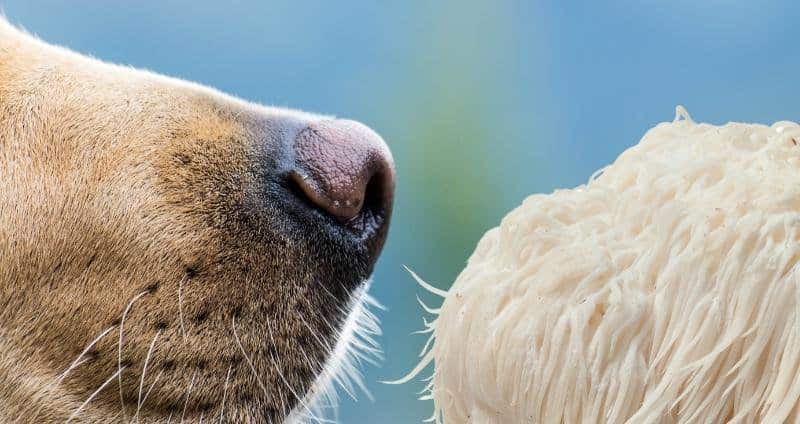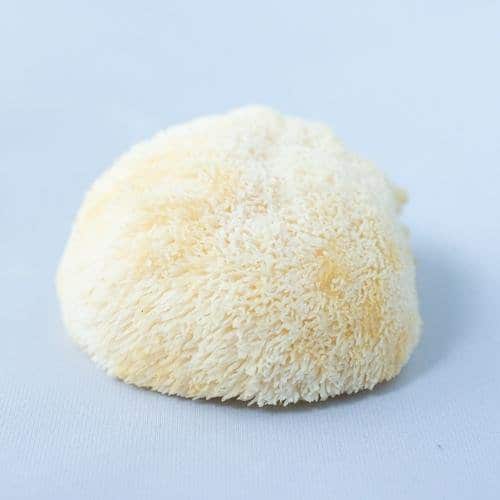Menu


This feature about the benefits of lion’s mane mushrooms for dogs was written by Real Mushrooms’ resident Registered Veterinary Technician (RVT), Joni Kamlet. Learn more about Joni’s 20 years of experience in animal care, canine rehabilitation, and pet health product development here.
An Ode to Lion’s Mane…
Beloved lion’s mane…
You are so good for my brain.
You are the mushroom that lit my fungi fire.
The more I learn about you, the more I desire.
We now have Lion’s Mane in our Real Mushrooms pet line repertoire…
Ok, clearly, I’m not a poet. But I do LOVE lion’s mane! Here’s my story why:
Lion’s mane mushrooms were my gateway mushroom. It’s the mushroom that totally upended my life (in a good way!).
Lion’s mane is my doorway to total mushroom obsession, causing me to leave my former job, buy 5 acres of mushroom-filled woodland in Virginia, and campaign Skye Chilton, Dr. Rob Silver and the Real Mushrooms team to let me work with them on Real Mushrooms’ new veterinary product line.
I came to learn about the wonderful possibilities of Lion’s Mane mushrooms for supporting the mind and cognition of pets in 2020. I was working in product development for a company that was making mushroom supplements. Since then, I have been blown away by the testimonials of pet parents who give this mushroom supplement to their dogs.
While learning about the potential benefits of functional mushrooms (e.g., turkey tail mushrooms, shiitake mushrooms, and cordyceps mushrooms), I became very excited about the possibility that incorporating lion’s mane mushrooms could support senior dogs with degenerative myelopathy (DM).
Similar to Lou Gehrig's disease in humans, DM is a neurodegenerative disease with very few supportive options.
DM slowly attacks a dog’s central nervous system by stripping away the protective coating called myelin. This leads to a breakdown of the white matter in the spine, which controls movement.
Early signs manifest as dragging of the hind limbs, a kind of “drunken sailor” walk. These dogs eventually lose fecal and urinary continence.
Eventually, as the disease progresses, the animal can no longer stand or support their body weight.
My background as a Veterinary nurse specializing in canine rehabilitation involved working with many of these DM dogs. I know intimately how frustrating and heartbreaking a disease it is.
In vitro studies of Lion's mane mushroom show that it supports the regeneration of the myelin sheath [1]. It was for this reason that I was very excited to see how lion’s mane would work with these DM dogs. I encouraged a group of veterinarians I worked with to try the lion’s mane supplements with their DM patients.
Truth be told, the feedback on how Lion’s Mane affected dogs with DM was inconclusive, but the overwhelming feedback I got was that the dogs on the lion’s mane products were exhibiting better cognitive function, and it was observable.
WOW - This got my attention! Could adding lion’s mane mushrooms to a dog’s diet have potential benefits for aging dogs showing signs of dementia?
Traditional Chinese Medicine: Before lion’s mane mushrooms were considered to help with doggie Alzheimer’s and improve cognitive function, they were used to support cardiovascular health and digestive health. These functional mushrooms were also taken to boost liver, lung, and spleen function.
Just like humans, as animals get older, they can develop Alzheimer’s-type symptoms.
Canine cognitive dysfunction (CCD) is also known as dog dementia. However, cats can also suffer from this condition. CCD is a growing area of concern in the veterinary community.
Aging is the main risk factor for CCD with 28% of dogs in the 11–to-12-year-old range, and 68% in dogs 15 years old and higher showing signs of CCD [2]. Cats fared a bit better with 36% of 11–to-21-year-old cats displaying signs of dementia [3].

Canine cognitive dysfunction can manifest as the following symptoms:
Let's go back to the group of veterinarians that I mentioned earlier in this blog.
Here is some feedback I received from them regarding lion’s mane mushroom benefits and how it affected their animal patients with dementia.
Improvements noted in dogs:
Please note that this was not a clinical study. This is information that pet parents shared with their veterinarians after using the product for a few weeks.
Given the fact that lion's mane mushrooms are safe for dogs and cats and mild tasting, I think it's an excellent addition to our veterinary offerings. Since lion’s mane powder extract has a subtle seafood flavor, cats should readily take to it.

Hericium erinaceus is mostly referred to as lion’s mane but can also be known as hedgehog fungus, monkey head mushroom, or pom-pom mushroom. This fungus resembles a brain and is a good example of the doctrine of signatures.
Although these mushrooms are historically used in traditional Chinese medicine to boost the brain and nervous system and for other benefits, studying lion’s mane mushrooms is a relatively new endeavor for researchers. Currently one of the most popular functional mushrooms, lion’s mane mushrooms are quite a rare find in nature.
The ability to cultivate lion’s mane mushrooms on a large scale commercially for their functional benefits and culinary use has significantly added to their current popularity. Unfortunately, the relative newness of these fungi on the Western market means fewer clinical studies have been completed.
Sadly, there are no clinical studies in dogs and cats yet. However, there are other animal studies that point to the interesting possibilities of this mushroom being used to enhance the quality of cognition in pets.

Lion’s mane mushrooms have been traditionally used in China and Japan as food and medicine to support gut health, nervous system weakness and debility, and even wound healing. These mushrooms are also used to support the spleen and nourish the kidneys, and they have an affinity for the lungs.
There are clinical studies showing lion’s mane can be highly beneficial in relation to inflammatory bowel disease, gastrointestinal issues, and ulcers [4].
One of the great benefits of lion’s mane mushrooms, like the other functional mushrooms, is that it is very effective at promoting a health inflammatory response in general. This mushroom is also considered an adaptogen that can help regulate the immune system.
Studies on lion’s mane mushrooms have been receiving a lot of attention in relation to its effect on cognitive function and brain health. This is a relatively new use for this mushroom, and is related to discoveries around its effect on Nerve growth factor (NGF) in the 1990’s. More recent clinical studies have supported this discovery [5].
Human clinical studies have shown lion's mane mushrooms to be anti-depressive and anxiolytic, improving scores on anxiety and depression scales [6]. Human studies have also demonstrated that Lion’s Mane can support better memory recall in aging people with mild memory issues [7] [8].
I would readily use lion’s mane mushroom supplements for pets with behavior issues, cognitive dysfunction, any type of GI issues, to support immune health, to support calming. I would definitely use it with DM dogs in spite of the mixed results I received initially.
Additional Readings: Learn more about the ways this unique fungus can support health in our article, Lion’s Mane Mushroom Benefits: A Complete Supplement Guide.
Lion’s Mane is a delicious culinary mushroom that is increasingly available at farmers' markets and specialty grocery stores. Like other edible mushrooms that humans can eat, Lion’s Mane is indeed safe for dogs and cats to consume.
However, it is important to cook Lion’s Mane mushroom before giving it to your pet because it can be difficult to digest in raw form.
Now, there is an easier way to serve up this functional mushroom to your pet. If you are hoping to use this mushroom as a means of improving you pet’s health, you can use a concentrated mushroom powder extract.
Real Mushrooms now provides its renowned mushroom powder extracts in a format suitable for giving to pets. Read below for more details about this functional supplement and how to give it to your pet.
The Organic Lions Mane Extract Capsules for Pets by Real Mushrooms is ideal because each capsule is pre-measured to make it suitable for animal dosing.
The Real Mushrooms line of pet supplements has the same high concentration of beta-glucans as its regular line of mushroom powders. There are no fillers or unnecessary additives, and the supplement is made from 100% Lion’s Mane mushroom, not mycelium.
Buying Guide: At Real Mushrooms, we only use 100% organic mushrooms (whole fruiting bodies) for our mushroom supplements so you can enjoy the health benefits of lion’s mane. Learn more about how to identify a quality lion’s mane extract supplement for your pet by reading our article Find the Best Lion’s Mane Supplement: The 4-Point Buying Guide.

Conveniently, using Real Mushrooms’ pet-specific Organic Lions Mane Extract Capsules for Pets makes the issue of dosing a breeze.
Dosing: 1 capsule for every 20-40 pounds of body weight or as directed by your veterinarian.
In the case of cats, which are difficult to pill, simply break the capsule apart and sprinkle the powder on their food. The mild seafood taste of Lion’s Mane seems to appeal to cats.
Pet owners need to take extra care of their pets, especially when it comes to the risk of cognitive disorders and complications in cardiovascular health.
The potential health benefits of lion’s mane don’t stop with its immune-boosting properties. It also has a considerable effect on your dog’s digestive health, supporting gut health and promoting an overall healthy immune system.
Check out our catalog of lion’s mane extract supplements and find the right additions so your furry friend can live a healthier lifestyle.
Disclaimer: The information or products mentioned in this article are provided as information resources only, and are not to be used or relied on to diagnose, treat, cure, or prevent any disease. This information does not create any patient-doctor relationship, and should not be used as a substitute for professional diagnosis and treatment. The information is intended for health care professionals only. The statements made in this article have not been evaluated by the Food and Drug Administration. Any products mentioned are not intended to diagnose, treat, cure, or prevent any disease. The information in this article is intended for educational purposes. The information is not intended to replace medical advice offered by licensed medical physicians. Please consult your doctor or health practitioner for any medical advice.

– Plus, Enjoy Exclusive Tips and Updates with Our Real Mushrooms for Pets Newsletter